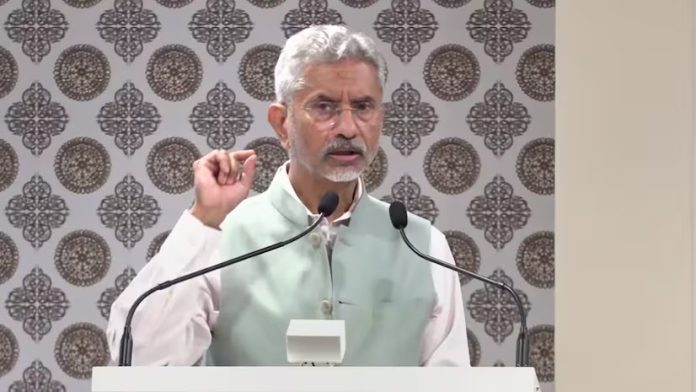Highlighting the country’s strong economic growth and convincing power in the G20 Summit that led to the adoption of the New Delhi Declaration, External Affairs Minister, S Jaishankar on Tuesday said that India is being seen as a solution provider globally, the country that has the potential to bridge the divide.
“Today, India is seen as a solution provider, one that bridges the divide. A large part of the reason is the growing economy, developments in technology and our talent. Even more is important is the mindset that democratic governance practices that have been brought by a strong and committed leadership which puts national interests at the forefront and equally believes in Vasudeva Kutumbakam,” Jaishankar said during a virtual address at the G20 University Connect event underscoring that India’s convincing power globally.
Jaishankar who was speaking at the G2O University Connect event stressed that the G2O summit hosted by India this year reflected its commitment to undertaking global skill demography and widening doors of opportunity.
“This is the first of its kind of G20 of equal interest to all of you, would be the G20 commitment to undertake global skill demography. Quantum plating the world with confidence such endeavours will help widen the doors of opportunity for all of you and global countries. When we say, one world, one family, one future, the world believes it.”
He emphasized the role and the commitment reflected by India in G20 to address skill gaps globally, provide adequate and sustainable social protection and work out policy options for sustainable financing of social protection.
He listed out the contributions undertaken by India in terms of the ‘Vaccine Maitri’ which further strengthened the country’s image as the first responder in emergency situations. India’s reputation as the “pharmacy of the world” stands reinforced the way it reached out to nations in the midst of a global crisis and supplied vaccines to 72 nations.
Lauding India’s initiatives during the COVID-19 pandemic by providing vaccines to the world countries, he said, “This is being seen in many instances, talking about the ‘Vaccine Maitri’, the conflict in Ukraine or indeed the challenges posed during the G20 itself. Whether it be contributions to global health via the International Day of Yoga and a global centre for traditional medicines or indeed sustainable development through the international solar alliance.”
“I would like to delve into many substantial outcomes of the G20 Summit that the world recognises India’s convening power and acceptance to its ideas is a key takeaway,” he said.
Elaborating further on the recognition of India worldwide and the solutions given by it accepted by the countries, EAM said that One Sun-One World -One Grid Initiative and the international year of Millets., matters including preparing for disasters, with the coalition for disaster resilient structure are initiatives are today recognised our voice respected and our solutions subscribed too.”
In the G20 meeting, the member nations agreed on bolstering investments in disaster and climate-resilient infrastructure with a collective vision that it will safeguard communities, strengthen economic stability, and ensure a rapid recovery post-disaster.
Jaishankar further spoke at length on the University Connect programme and stated that the G20 Presidency began with it in the first place.
“We began the presidency with University Connect programme…Our endeavours to make India a developed nation by the centenary of our independence stems from the collective desire to build a more prosperous nation for the future generations,” Jaishankar said.
Jaishankar emphasised that the world is looking at India noticing the transformational changes happening in the country.
“Both the developing as well as the developed are taking a lot of learnings from us. As they see transformation changes underway in the country. And it is for you, the youth of our nation, to take this forward, as we progress in our quest to become Viksit Bharat,” he said.
The G20 Summit took place on September 9-10 in New Delhi at the Bharat Mandapam Convention Centre. It saw a massive participation from leaders across the world.
The G20 University Connect Finale was attended at the event venue by about 3000 students, faculty members, and Vice Chancellors of the participating Universities. In addition, students from across the country have also joined the event Live.
India on Tuesday asked the UN member states not to allow “political convenience” to determine responses to terrorism, extremism and violence, in what appears to be a veiled attack on Canada amidst the diplomatic standoff.









































